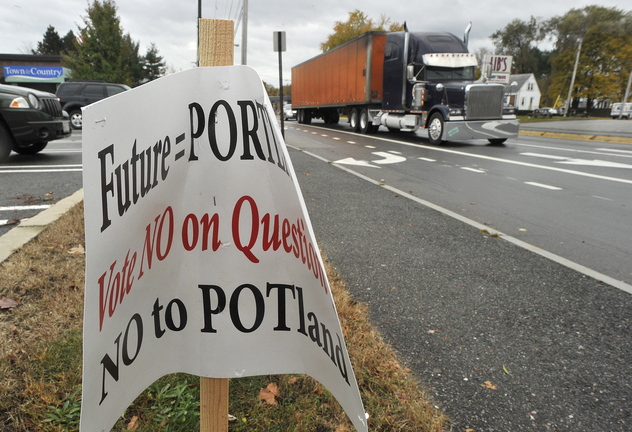Portland officials took down four signs calling for defeat of the proposal on next week’s ballot to legalize marijuana, only to direct the staff to put them back up Friday afternoon when they realized they may have made a mistake.
City Clerk Kathy Jones said early Friday that the “No on Question 1” signs were removed from the Eastern Promenade in response to a complaint to the city about their lack of disclosure saying who paid for them. For years, the city has removed political signs that do not conspicuously display who paid for them, Jones said.
This time, the city appears to have overstepped.
By state law, disclosures are required only for campaign expenditures exceeding $500. A woman who says she paid for the No on Question 1 signs, and the printer who made them, said they cost only about $200. She said Friday that more than four signs were missing and none had been returned by 5 p.m.
No one has registered a political committee to oppose the marijuana initiative, and no permit is required to post campaign signs, so city officials did not know who posted the signs or how much they spent.
After learning what a reporter was told about the cost of the signs and conferring with the staff of the state ethics commission later Friday, Jones said they would be replaced. “I have called public services to have them put the four signs back,” she said in an email.
The small white signs began to sprout this week on the Eastern Prom and along Washington Avenue. They read “Future = PORTLAND. Vote NO on Question 1. No to POTland.”
The woman who claimed responsibility identified herself only as Wendy when she contacted the Portland Press Herald this week to take credit for the signs. She said she would not give her last name because she feared that her family and her business would be targeted by those with differing views.
She and her husband spent $214 for 46 signs and sign posts, she said. Dale Rand, who owns Dale Rand Printing on Washington Avenue, confirmed the price paid for the order.
The signs were posted on Ocean Avenue, Payson Park, Washington Avenue, the Fore River Parkway and the Eastern Promenade. While the city took four of the signs from Eastern Prom, it removed no others because they generated no complaints, said Jones.
Wendy said she is the married mother of three elementary school children and felt compelled to put up the signs because she is concerned about the effect the ordinance would have on children. While the ordinance would legalize marijuana for adults, she opposes it because it may increase access for young people, she said.
Also, she said, the ordinance does not set up a legal way for people to get marijuana.
Jones said the signs were removed because, with no disclosure, there was no way for the city to confirm that they cost less than $500.
“That’s been the rule of thumb for years because you have to be able to contact the candidate or group,” she said. “It’s for transparency. That transparency is the disclosure.”
But Wendy said the city could have called the printer, who was identified Wednesday in the Press Herald. “It could have been resolved with one phone call to Dale Rand.”
When asked how she felt about the removal of the signs, she said, “It doesn’t surprise me. We have (City Council) members supporting the amendment.”
The signs were the first visible opposition to the marijuana initiative, but the opposition grew Friday as three state representatives said they oppose legalizing marijuana in Portland and the Maine Public Health Association issued a statement opposing the proposal.
Although proponents say marijuana is safer than alcohol, the Maine Public Health Association said the risks of marijuana are well documented.
“If this addictive and cancer-causing substance becomes legalized, we can expect to see an increase in adverse health outcomes such as automobile fatalities, harm to brain development in young people, lung cancer and emergency room visits,” board President-elect Doug Michael said in a written statement.
Question 1, which the Portland Green Independent Committee got on the ballot through a petition drive, would legalize possession of as much as 2.5 ounces of marijuana by anyone 21 or older within city limits.
Marijuana is illegal under state and federal law, and possession will remain a civil violation under state law regardless of the outcome Tuesday.
The initiative would not legalize the sale or purchase of marijuana, but would allow adults to “engage in activities for the purposes of ascertaining the possession of marijuana and paraphernalia.”
It would prohibit recreational use of marijuana in public spaces, on school grounds or on transportation infrastructure, and would let landlords prohibit tenants from using marijuana on their property.
Randy Billings can be contacted at 791-6346 or at:
Twitter: @randybillings
Send questions/comments to the editors.




Comments are no longer available on this story